必修3 Module 5 Great People and Great Inventions of.教案
文档属性
| 名称 | 必修3 Module 5 Great People and Great Inventions of.教案 |
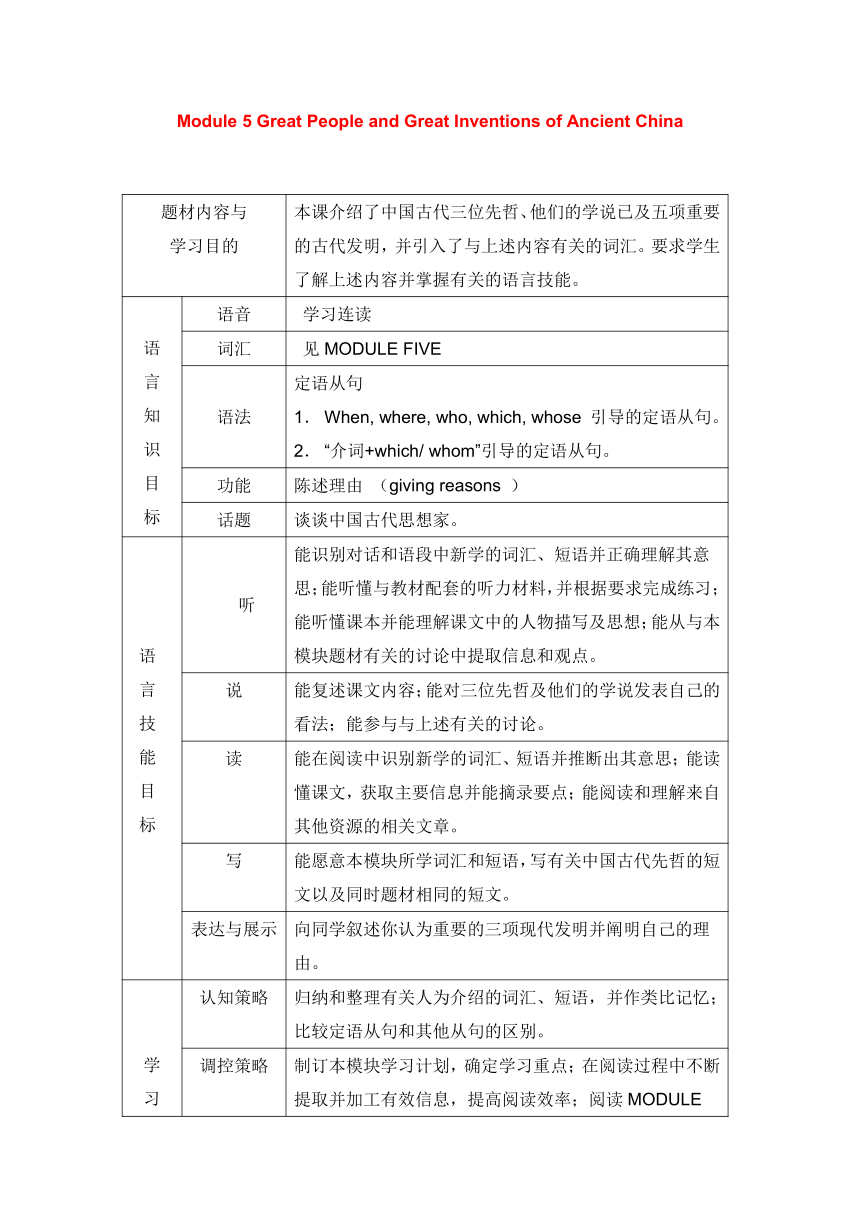
|
|
| 格式 | zip | ||
| 文件大小 | 25.7KB | ||
| 资源类型 | 教案 | ||
| 版本资源 | 外研版 | ||
| 科目 | 英语 | ||
| 更新时间 | 2016-04-05 00:00:00 | ||
图片预览

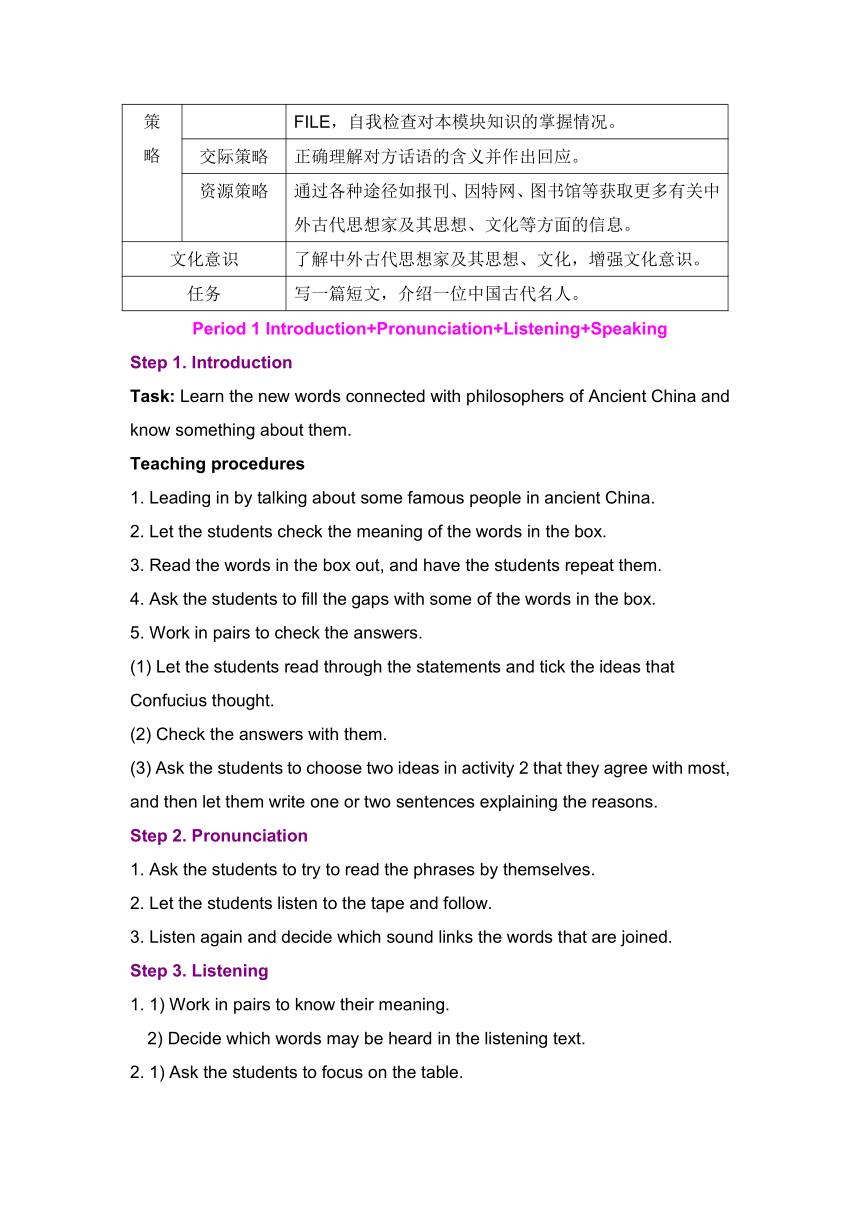
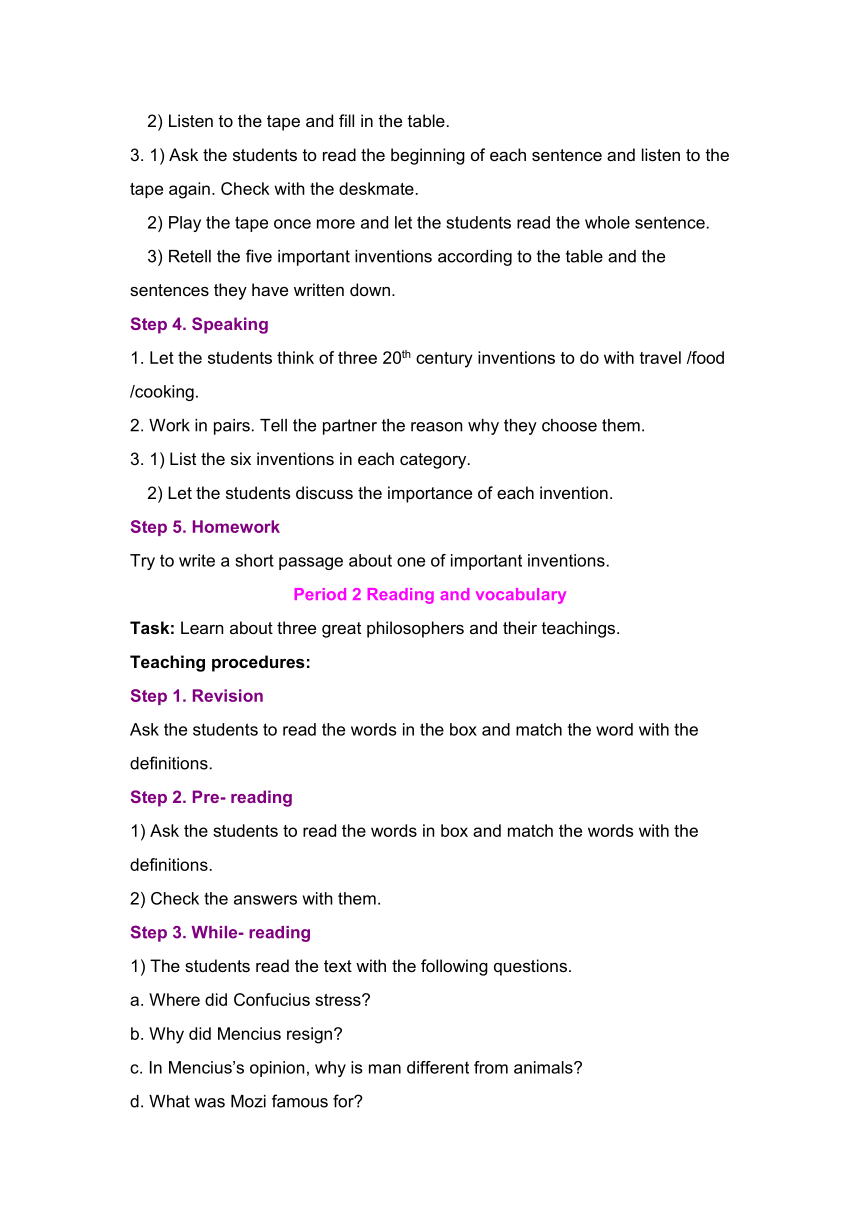
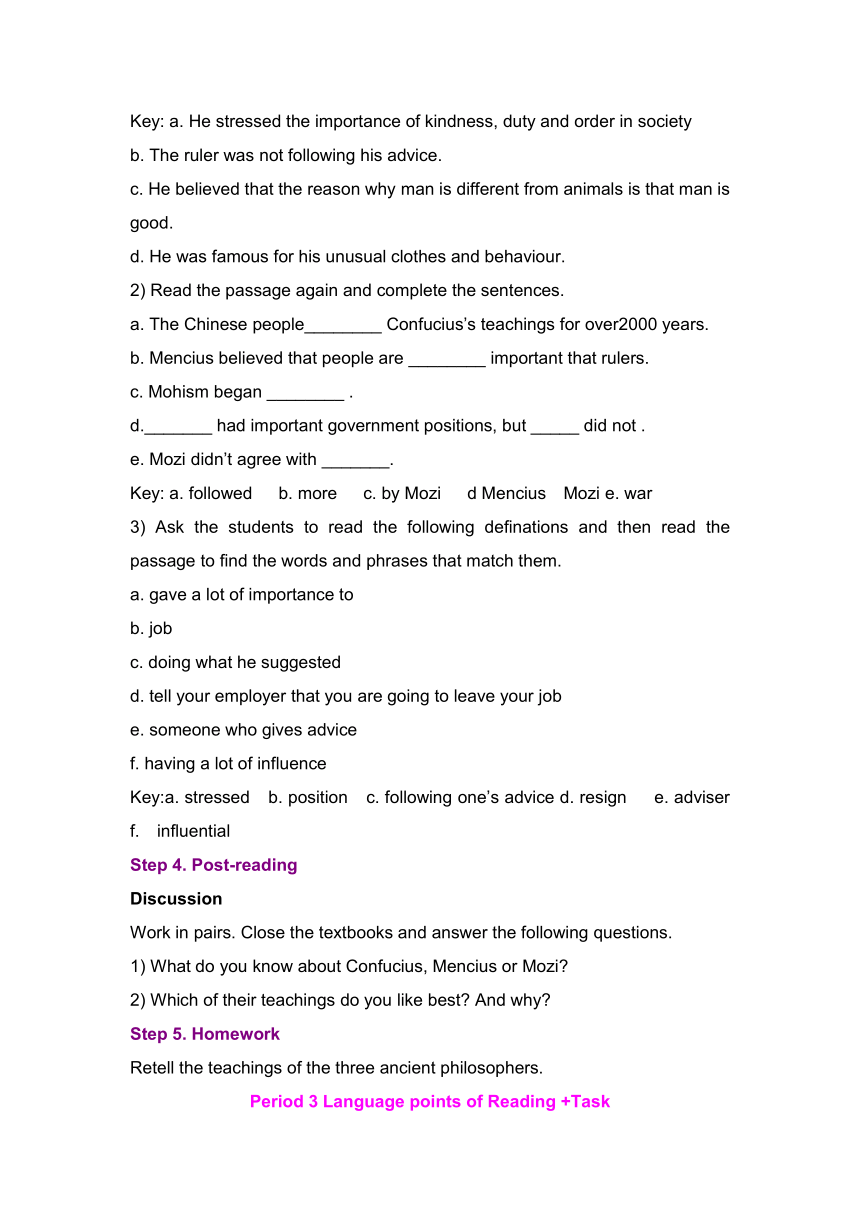
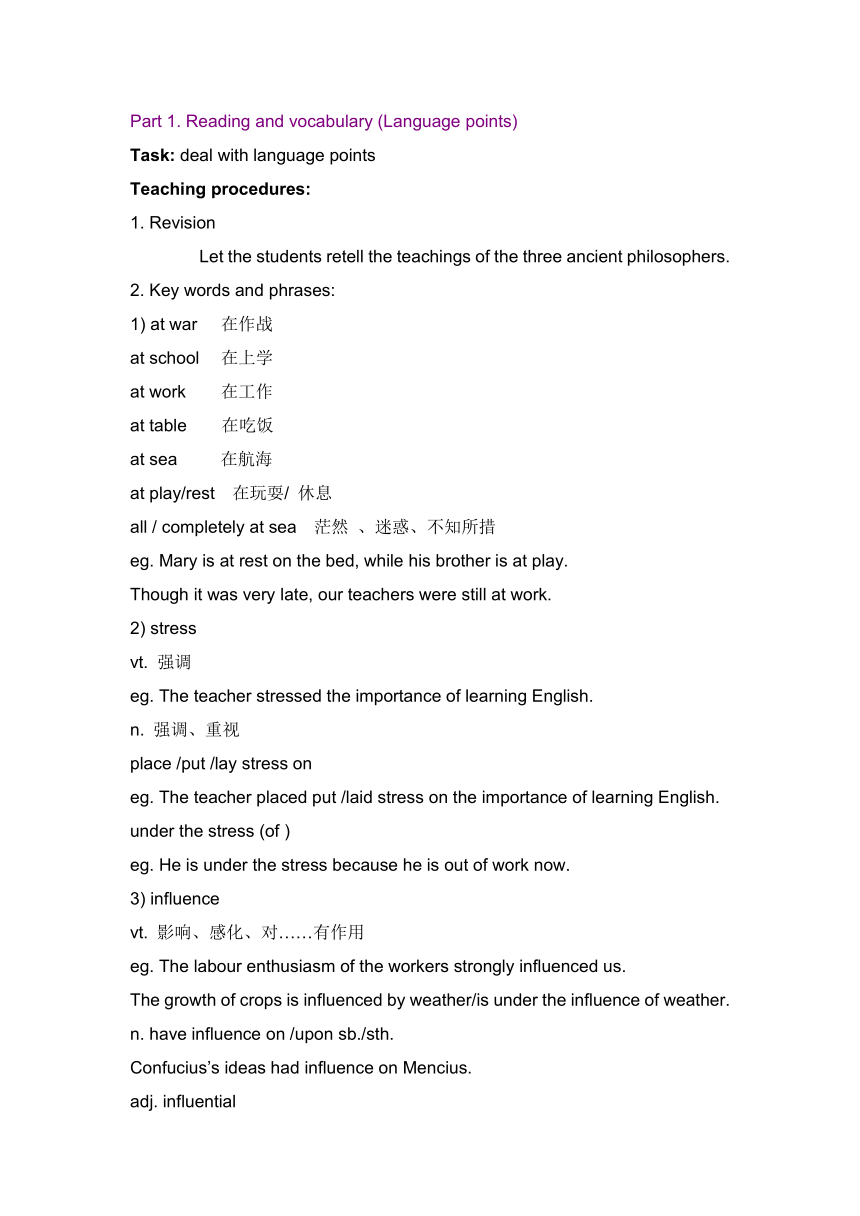
文档简介
Module 5 Great People and Great Inventions of Ancient China
题材内容与学习目的 本课介绍了中国古代三位先哲、他们的学说已及五项重要的古代发明,并引入了与上述内容有关的词汇。要求学生了解上述内容并掌握有关的语言技能。
语言知识目标 语音 学习连读
词汇 见MODULE FIVE
语法 定语从句When, where, who, which, whose 引导的定语从句。“介词+which/ whom”引导的定语从句。
功能 陈述理由 (giving reasons )
话题 谈谈中国古代思想家。
语 言 技 能 目 标 听 能识别对话和语段中新学的词汇、短语并正确 ( http: / / www.21cnjy.com )理解其意思;能听懂与教材配套的听力材料,并根据要求完成练习;能听懂课本并能理解课文中的人物描写及思想;能从与本模块题材有关的讨论中提取信息和观点。
说 能复述课文内容;能对三位先哲及他们的学说发表自己的看法;能参与与上述有关的讨论。
读 能在阅读中识别新学的词汇、短语并推断出其意思;能读懂课文,获取主要信息并能摘录要点;能阅读和理解来自其他资源的相关文章。
写 能愿意本模块所学词汇和短语,写有关中国古代先哲的短文以及同时题材相同的短文。
表达与展示 向同学叙述你认为重要的三项现代发明并阐明自己的理由。
学习策略 认知策略 归纳和整理有关人为介绍的词汇、短语,并作类比记忆;比较定语从句和其他从句的区别。
调控策略 制订本模块学习计划,确定学习重点;在阅读过 ( http: / / www.21cnjy.com )程中不断提取并加工有效信息,提高阅读效率;阅读MODULE FILE,自我检查对本模块知识的掌握情况。
交际策略 正确理解对方话语的含义并作出回应。
资源策略 通过各种途径如报刊、因特网、图书馆等获取更多有关中外古代思想家及其思想、文化等方面的信息。
文化意识 了解中外古代思想家及其思想、文化,增强文化意识。
任务 写一篇短文,介绍一位中国古代名人。
Period 1 Introduction+Pronunciation+Listening+Speaking
Step 1. Introduction
Task: Learn the new w ( http: / / www.21cnjy.com )ords connected with philosophers of Ancient China and know something about them.
Teaching procedures
1. Leading in by talking about some famous people in ancient China.
2. Let the students check the meaning of the words in the box.
3. Read the words in the box out, and have the students repeat them.
4. Ask the st ( http: / / www.21cnjy.com )udents to fill the gaps with some of the words in the box.
5. Work in pairs to check the answers.
(1) Let the student ( http: / / www.21cnjy.com )s read through the statements and tick the ideas that Confucius thought.
(2) Check the answers with them.
(3) Ask the stude ( http: / / www.21cnjy.com )nts to choose two ideas in activity 2 that they agree with most,
and then let them write one or two sentences explaining the reasons.
Step 2. Pronunciation
1. Ask the students to try to read the phrases by themselves.
2. Let the students listen to the tape and follow.
3. Listen again a ( http: / / www.21cnjy.com )nd decide which sound links the words that are joined.
Step 3. Listening
1. 1) Work in pairs to know their meaning.
2) Decide which words may be heard in the listening text.
2. 1) Ask the students to focus on the table.
2) Listen to the tape and fill in the table.
3. 1) Ask the students ( http: / / www.21cnjy.com ) to read the beginning of each sentence and listen to the tape again. Check with the deskmate.
2) Play the t ( http: / / www.21cnjy.com )ape once more and let the students read the whole sentence.
3) Retell th ( http: / / www.21cnjy.com )e five important inventions according to the table and the sentences they have written down.
Step 4. Speaking
1. Let the students ( http: / / www.21cnjy.com ) think of three 20th century inventions to do with travel /food /cooking.
2. Work in pairs. Tell the partner the reason why they choose them.
3. 1) List the six inventions in each category.
2) Let the students discuss the importance of each invention.
Step 5. Homework
Try to write a short passage about one of important inventions.
Period 2 Reading and vocabulary
Task: Learn about three great philosophers and their teachings.
Teaching procedures:
Step 1. Revision
Ask the students to ( http: / / www.21cnjy.com ) read the words in the box and match the word with the definitions.
Step 2. Pre- reading
1) Ask the studen ( http: / / www.21cnjy.com )ts to read the words in box and match the words with the definitions.
2) Check the answers with them.
Step 3. While- reading
1) The students read the text with the following questions.
a. Where did Confucius stress
b. Why did Mencius resign
c. In Mencius’s opinion, why is man different from animals
d. What was Mozi famous for
Key: a. He stressed ( http: / / www.21cnjy.com )the importance of kindness, duty and order in society
b. The ruler was not following his advice.
c. He believed tha ( http: / / www.21cnjy.com )t the reason why man is different from animals is that man is good.
d. He was famous for his unusual clothes and behaviour.
2) Read the passage again and complete the sentences.
a. The Chinese peop ( http: / / www.21cnjy.com )le________ Confucius’s teachings for over2000 years.
b. Mencius believed that people are ________ important that rulers.
c. Mohism began ________ .
d._______ had important government positions, but _____ did not .
e. Mozi didn’t agree with _______.
Key: a. followed b. more c. by Mozi d Mencius Mozi e. war
3) Ask the stud ( http: / / www.21cnjy.com )ents to read the following definations and then read the passage to find the words and phrases that match them.
a. gave a lot of importance to
b. job
c. doing what he suggested
d. tell your employer that you are going to leave your job
e. someone who gives advice
f. having a lot of influence
Key:a. stressed b. ( http: / / www.21cnjy.com ) position c. following one’s advice d. resign e. adviser f. influential
Step 4. Post-reading
Discussion
Work in pairs. Close ( http: / / www.21cnjy.com )the textbooks and answer the following questions.
1) What do you know about Confucius, Mencius or Mozi
2) Which of their teachings do you like best And why
Step 5. Homework
Retell the teachings of the three ancient philosophers.
Period 3 Language points of Reading +Task
Part 1. Reading and vocabulary (Language points)
Task: deal with language points
Teaching procedures:
1. Revision
Let th ( http: / / www.21cnjy.com )e students retell the teachings of the three ancient philosophers.
2. Key words and phrases:
1) at war 在作战
at school 在上学
at work 在工作
at table 在吃饭
at sea 在航海
at play/rest 在玩耍/ 休息
all / completely at sea 茫然 、迷惑、不知所措
eg. Mary is at rest on the bed, while his brother is at play.
Though it was very late, our teachers were still at work.
2) stress
vt. 强调
eg. The teacher stressed the importance of learning English.
n. 强调、重视
place /put /lay stress on
eg. The teacher pla ( http: / / www.21cnjy.com )ced put /laid stress on the importance of learning English.
under the stress (of )
eg. He is under the stress because he is out of work now.
3) influence
vt. 影响、感化、对……有作用
eg. The labour enthusiasm of the workers strongly influenced us.
The growth of crops ( http: / / www.21cnjy.com ) is influenced by weather/is under the influence of weather.
n. have influence on /upon sb./sth.
Confucius’s ideas had influence on Mencius.
adj. influential
4) bring up 抚养
eg. We are brought by our parents.
教育、培养
eg. He was brought up to save water since he was a China.
提出(话题)
eg. My new suggestion was brought up at the meeting.
呕吐
eg. Tom brought up what he ate just now.
5) position n. 职位、工作
eg. She got a position as a cook.
地位
eg. John has a high position in society.
位置、方位
eg. Can you show the position of Beijing on a map
6) resign v. 辞职
eg. He resigned his post because he wanted to go abroad.
把(某人)托付给…… 委托
eg. My mother resigned a task to me.
spend time /money on sth. /in doing sth.
eg. I spent much money on books / (in) buying books.
She spent two hours doing her homework.
8) be similar to /in
eg. Her coat is similar to mine.
They are similar in character.
Part 2. Task
Task: write about a famous person from ancient China.
Teaching procedures:
1. Think of someone ( http: / / www.21cnjy.com )they’d like to write about and make notes about the important events in his life.
2. Use useful expressions from philosophers of Ancient China.
3. Write two or three paragraphs about this person.
Homework
1. Go over what they have learned.
2. Find out the defining attributive clauses in the reading text.
Period four Grammar 1+ Grammar 2
Part 1. Grammar 1
Task: Learn about Defi ( http: / / www.21cnjy.com )ning attributive clauses by who, which, whose, where and when.
Teaching procedures:
1. Revision
Check their homewo ( http: / / www.21cnjy.com )rk. Let the students read out the defining attributive clauses in the reading text.
1) Ancient China wa ( http: / / www.21cnjy.com )s a place where states were often at war with each other.
2) But it was also a time when there were many great philosophers.
3) Confucius is the ( http: / / www.21cnjy.com )philosopher whose influence has been the greatest.
4) Mozi was another teacher who was very influential.
5) He came from a family which was very poor.
2. Let the studen ( http: / / www.21cnjy.com )ts finish the exercises on the student’s book to ensure that
they are clear about how defining relative clauses work.
3. Give the students some other exercises to practice.
4. Pay attention t ( http: / / www.21cnjy.com )o some special usages of “that” and “which” , “as” and “which”.
5. Ask the students ( http: / / www.21cnjy.com ) to make sentences by themselves using which, that, as, who, whom, whose, where, when.
Part 2. Grammar 2
Task: Deal with defining relative clauses :prep + whom, prep + which.
Teaching procedures:
1. Give the students some examples to compare.
1) He lives in a house whose windows all face the north.
= He lives in a house of which the windows all face the north.
2) The students whose brother has gone to university is very clever.
=The student the brother of whom has gone to university is clever.
3)October 1st,1949 is the day when New China was founded.
=October 1st, 1949 is the day on which New China was founded.
4)We paid a visit to the village where MaoZedong was born..
=We paid a visit to the village in which MaoZedong was born.
5) Can you tell me the reason why he was late
=Can you tell me the reason for which he was late
2. Explain th ( http: / / www.21cnjy.com )e usages of defining attributive clauses: prep +which and prep + whom.
3. Give the students some other exercises to practice.
4. Let the students m ( http: / / www.21cnjy.com )ake some sentences using prep + which and prep + whom .
5. Ask the students to ( http: / / www.21cnjy.com ) complete the exercises on the student’s book. Homework: Try to make as many defining relative clauses as they can.
Period five Function + Vocabulary and Speaking + Writing
Part 1. Function
Task: learn how to give reasons
Teaching procedures:
1. Revision Let the students to complete the sentences.
That/who is standing there.
Whose name is Tom
1) The man the name of whose is Tom is warm- hearted.
whom you met just now
to whom you turned for help
which /that belongs to her
whose windows are very big
2) The house the windows of which are very big is very beautiful.
where you visited yesterday
in which she lives
when I visited the Great Wall
3) The day won’t be forgotten. On which I visited the Great Wall
Why he was late
4) The reason was unknown. for which he was late
2. Ask the students to ( http: / / www.21cnjy.com ) find out the sentences pattern about giving reasons.
1)… because…
2) The reason why …is that …
3. Rewrite the sentences on the student’s book.
4. Let the stu ( http: / / www.21cnjy.com )dents make some sentences to practice the usages of giving reasons.
Part 2. Vocabulary and speaking
Task: Practice s ( http: / / www.21cnjy.com )peaking with the sentences patterns of giving reasons.
Teaching procedures:
1. Ask the students t ( http: / / www.21cnjy.com )o read out the words and make sure they know the meanings of them.
A sense of responsibility duty honesty
justice kindness love respect
2. Work in pairs. Put the ideas in order of importance in society.
3. Have some pairs tell the whole class what they decided.
4. Discussion
Let the students to ( http: / / www.21cnjy.com ) discuss what they think is most important and why.
Part 3. Writing
Task: Write an essay in their own view.
Teaching procedures:
1. 1) Read throug ( http: / / www.21cnjy.com )h the four descriptions while the students follow in their books.
2) Ask them to d ( http: / / www.21cnjy.com )o this activity individually, then check with a partner.
3) Call back the answers from the whole class.
2. Read the essay a ( http: / / www.21cnjy.com )gain and find the answers of the questions on the student’s book.
3. 1) Write an es ( http: / / www.21cnjy.com )say on this subject: the advantages and disadvantages of television.
2) Exchanges their ( http: / / www.21cnjy.com ) writings with a partner for peer checking of structures,
organization and content.
3) Have a few students read their essays out to the whole class.
Homework Write an ( http: / / www.21cnjy.com )essay on this subject: the advantages and disadvantages of computer.
Period six Everyday English + Cultural corner + Module File
Part 1. Everyday English
Task: Learn some useful expressions.
Teaching procedures:
1. Revision ( http: / / www.21cnjy.com ) Check their homework. Have a few of them to read out the essay they have written.
2. Read through t ( http: / / www.21cnjy.com )he expressions and make sure they know the meaning of them.
3. Ask them to complete the gap-fill individually.
4. Check the answers with them.
Part 2. Cultural corner
Task: Learn about the Industrial Revolution.
Teaching procedures:
1. Give the students some questions and let them read the passage.
1) What do know about the Industrial Revoluton
2) Where did it start first
2. Read the ( http: / / www.21cnjy.com )passage again and answer the questions on the student’s book.
3. Work in groups to complete the table.
The Industrial Revolution in Europe and China
The things to compare Europe China
Age
Changes
Working conditions
People’s lives
4. Explain what the students don’t understand.
Part 3. Module File
1. Ask the studen ( http: / / www.21cnjy.com )ts to read through this part carefully, ticking the things they
haven’t mastered.
2. Pair the students to explain what they haven’t mastered.
3. If necessary, the teacher can help them.
Homework: Go over the new words phrases and patterns of this module.
题材内容与学习目的 本课介绍了中国古代三位先哲、他们的学说已及五项重要的古代发明,并引入了与上述内容有关的词汇。要求学生了解上述内容并掌握有关的语言技能。
语言知识目标 语音 学习连读
词汇 见MODULE FIVE
语法 定语从句When, where, who, which, whose 引导的定语从句。“介词+which/ whom”引导的定语从句。
功能 陈述理由 (giving reasons )
话题 谈谈中国古代思想家。
语 言 技 能 目 标 听 能识别对话和语段中新学的词汇、短语并正确 ( http: / / www.21cnjy.com )理解其意思;能听懂与教材配套的听力材料,并根据要求完成练习;能听懂课本并能理解课文中的人物描写及思想;能从与本模块题材有关的讨论中提取信息和观点。
说 能复述课文内容;能对三位先哲及他们的学说发表自己的看法;能参与与上述有关的讨论。
读 能在阅读中识别新学的词汇、短语并推断出其意思;能读懂课文,获取主要信息并能摘录要点;能阅读和理解来自其他资源的相关文章。
写 能愿意本模块所学词汇和短语,写有关中国古代先哲的短文以及同时题材相同的短文。
表达与展示 向同学叙述你认为重要的三项现代发明并阐明自己的理由。
学习策略 认知策略 归纳和整理有关人为介绍的词汇、短语,并作类比记忆;比较定语从句和其他从句的区别。
调控策略 制订本模块学习计划,确定学习重点;在阅读过 ( http: / / www.21cnjy.com )程中不断提取并加工有效信息,提高阅读效率;阅读MODULE FILE,自我检查对本模块知识的掌握情况。
交际策略 正确理解对方话语的含义并作出回应。
资源策略 通过各种途径如报刊、因特网、图书馆等获取更多有关中外古代思想家及其思想、文化等方面的信息。
文化意识 了解中外古代思想家及其思想、文化,增强文化意识。
任务 写一篇短文,介绍一位中国古代名人。
Period 1 Introduction+Pronunciation+Listening+Speaking
Step 1. Introduction
Task: Learn the new w ( http: / / www.21cnjy.com )ords connected with philosophers of Ancient China and know something about them.
Teaching procedures
1. Leading in by talking about some famous people in ancient China.
2. Let the students check the meaning of the words in the box.
3. Read the words in the box out, and have the students repeat them.
4. Ask the st ( http: / / www.21cnjy.com )udents to fill the gaps with some of the words in the box.
5. Work in pairs to check the answers.
(1) Let the student ( http: / / www.21cnjy.com )s read through the statements and tick the ideas that Confucius thought.
(2) Check the answers with them.
(3) Ask the stude ( http: / / www.21cnjy.com )nts to choose two ideas in activity 2 that they agree with most,
and then let them write one or two sentences explaining the reasons.
Step 2. Pronunciation
1. Ask the students to try to read the phrases by themselves.
2. Let the students listen to the tape and follow.
3. Listen again a ( http: / / www.21cnjy.com )nd decide which sound links the words that are joined.
Step 3. Listening
1. 1) Work in pairs to know their meaning.
2) Decide which words may be heard in the listening text.
2. 1) Ask the students to focus on the table.
2) Listen to the tape and fill in the table.
3. 1) Ask the students ( http: / / www.21cnjy.com ) to read the beginning of each sentence and listen to the tape again. Check with the deskmate.
2) Play the t ( http: / / www.21cnjy.com )ape once more and let the students read the whole sentence.
3) Retell th ( http: / / www.21cnjy.com )e five important inventions according to the table and the sentences they have written down.
Step 4. Speaking
1. Let the students ( http: / / www.21cnjy.com ) think of three 20th century inventions to do with travel /food /cooking.
2. Work in pairs. Tell the partner the reason why they choose them.
3. 1) List the six inventions in each category.
2) Let the students discuss the importance of each invention.
Step 5. Homework
Try to write a short passage about one of important inventions.
Period 2 Reading and vocabulary
Task: Learn about three great philosophers and their teachings.
Teaching procedures:
Step 1. Revision
Ask the students to ( http: / / www.21cnjy.com ) read the words in the box and match the word with the definitions.
Step 2. Pre- reading
1) Ask the studen ( http: / / www.21cnjy.com )ts to read the words in box and match the words with the definitions.
2) Check the answers with them.
Step 3. While- reading
1) The students read the text with the following questions.
a. Where did Confucius stress
b. Why did Mencius resign
c. In Mencius’s opinion, why is man different from animals
d. What was Mozi famous for
Key: a. He stressed ( http: / / www.21cnjy.com )the importance of kindness, duty and order in society
b. The ruler was not following his advice.
c. He believed tha ( http: / / www.21cnjy.com )t the reason why man is different from animals is that man is good.
d. He was famous for his unusual clothes and behaviour.
2) Read the passage again and complete the sentences.
a. The Chinese peop ( http: / / www.21cnjy.com )le________ Confucius’s teachings for over2000 years.
b. Mencius believed that people are ________ important that rulers.
c. Mohism began ________ .
d._______ had important government positions, but _____ did not .
e. Mozi didn’t agree with _______.
Key: a. followed b. more c. by Mozi d Mencius Mozi e. war
3) Ask the stud ( http: / / www.21cnjy.com )ents to read the following definations and then read the passage to find the words and phrases that match them.
a. gave a lot of importance to
b. job
c. doing what he suggested
d. tell your employer that you are going to leave your job
e. someone who gives advice
f. having a lot of influence
Key:a. stressed b. ( http: / / www.21cnjy.com ) position c. following one’s advice d. resign e. adviser f. influential
Step 4. Post-reading
Discussion
Work in pairs. Close ( http: / / www.21cnjy.com )the textbooks and answer the following questions.
1) What do you know about Confucius, Mencius or Mozi
2) Which of their teachings do you like best And why
Step 5. Homework
Retell the teachings of the three ancient philosophers.
Period 3 Language points of Reading +Task
Part 1. Reading and vocabulary (Language points)
Task: deal with language points
Teaching procedures:
1. Revision
Let th ( http: / / www.21cnjy.com )e students retell the teachings of the three ancient philosophers.
2. Key words and phrases:
1) at war 在作战
at school 在上学
at work 在工作
at table 在吃饭
at sea 在航海
at play/rest 在玩耍/ 休息
all / completely at sea 茫然 、迷惑、不知所措
eg. Mary is at rest on the bed, while his brother is at play.
Though it was very late, our teachers were still at work.
2) stress
vt. 强调
eg. The teacher stressed the importance of learning English.
n. 强调、重视
place /put /lay stress on
eg. The teacher pla ( http: / / www.21cnjy.com )ced put /laid stress on the importance of learning English.
under the stress (of )
eg. He is under the stress because he is out of work now.
3) influence
vt. 影响、感化、对……有作用
eg. The labour enthusiasm of the workers strongly influenced us.
The growth of crops ( http: / / www.21cnjy.com ) is influenced by weather/is under the influence of weather.
n. have influence on /upon sb./sth.
Confucius’s ideas had influence on Mencius.
adj. influential
4) bring up 抚养
eg. We are brought by our parents.
教育、培养
eg. He was brought up to save water since he was a China.
提出(话题)
eg. My new suggestion was brought up at the meeting.
呕吐
eg. Tom brought up what he ate just now.
5) position n. 职位、工作
eg. She got a position as a cook.
地位
eg. John has a high position in society.
位置、方位
eg. Can you show the position of Beijing on a map
6) resign v. 辞职
eg. He resigned his post because he wanted to go abroad.
把(某人)托付给…… 委托
eg. My mother resigned a task to me.
spend time /money on sth. /in doing sth.
eg. I spent much money on books / (in) buying books.
She spent two hours doing her homework.
8) be similar to /in
eg. Her coat is similar to mine.
They are similar in character.
Part 2. Task
Task: write about a famous person from ancient China.
Teaching procedures:
1. Think of someone ( http: / / www.21cnjy.com )they’d like to write about and make notes about the important events in his life.
2. Use useful expressions from philosophers of Ancient China.
3. Write two or three paragraphs about this person.
Homework
1. Go over what they have learned.
2. Find out the defining attributive clauses in the reading text.
Period four Grammar 1+ Grammar 2
Part 1. Grammar 1
Task: Learn about Defi ( http: / / www.21cnjy.com )ning attributive clauses by who, which, whose, where and when.
Teaching procedures:
1. Revision
Check their homewo ( http: / / www.21cnjy.com )rk. Let the students read out the defining attributive clauses in the reading text.
1) Ancient China wa ( http: / / www.21cnjy.com )s a place where states were often at war with each other.
2) But it was also a time when there were many great philosophers.
3) Confucius is the ( http: / / www.21cnjy.com )philosopher whose influence has been the greatest.
4) Mozi was another teacher who was very influential.
5) He came from a family which was very poor.
2. Let the studen ( http: / / www.21cnjy.com )ts finish the exercises on the student’s book to ensure that
they are clear about how defining relative clauses work.
3. Give the students some other exercises to practice.
4. Pay attention t ( http: / / www.21cnjy.com )o some special usages of “that” and “which” , “as” and “which”.
5. Ask the students ( http: / / www.21cnjy.com ) to make sentences by themselves using which, that, as, who, whom, whose, where, when.
Part 2. Grammar 2
Task: Deal with defining relative clauses :prep + whom, prep + which.
Teaching procedures:
1. Give the students some examples to compare.
1) He lives in a house whose windows all face the north.
= He lives in a house of which the windows all face the north.
2) The students whose brother has gone to university is very clever.
=The student the brother of whom has gone to university is clever.
3)October 1st,1949 is the day when New China was founded.
=October 1st, 1949 is the day on which New China was founded.
4)We paid a visit to the village where MaoZedong was born..
=We paid a visit to the village in which MaoZedong was born.
5) Can you tell me the reason why he was late
=Can you tell me the reason for which he was late
2. Explain th ( http: / / www.21cnjy.com )e usages of defining attributive clauses: prep +which and prep + whom.
3. Give the students some other exercises to practice.
4. Let the students m ( http: / / www.21cnjy.com )ake some sentences using prep + which and prep + whom .
5. Ask the students to ( http: / / www.21cnjy.com ) complete the exercises on the student’s book. Homework: Try to make as many defining relative clauses as they can.
Period five Function + Vocabulary and Speaking + Writing
Part 1. Function
Task: learn how to give reasons
Teaching procedures:
1. Revision Let the students to complete the sentences.
That/who is standing there.
Whose name is Tom
1) The man the name of whose is Tom is warm- hearted.
whom you met just now
to whom you turned for help
which /that belongs to her
whose windows are very big
2) The house the windows of which are very big is very beautiful.
where you visited yesterday
in which she lives
when I visited the Great Wall
3) The day won’t be forgotten. On which I visited the Great Wall
Why he was late
4) The reason was unknown. for which he was late
2. Ask the students to ( http: / / www.21cnjy.com ) find out the sentences pattern about giving reasons.
1)… because…
2) The reason why …is that …
3. Rewrite the sentences on the student’s book.
4. Let the stu ( http: / / www.21cnjy.com )dents make some sentences to practice the usages of giving reasons.
Part 2. Vocabulary and speaking
Task: Practice s ( http: / / www.21cnjy.com )peaking with the sentences patterns of giving reasons.
Teaching procedures:
1. Ask the students t ( http: / / www.21cnjy.com )o read out the words and make sure they know the meanings of them.
A sense of responsibility duty honesty
justice kindness love respect
2. Work in pairs. Put the ideas in order of importance in society.
3. Have some pairs tell the whole class what they decided.
4. Discussion
Let the students to ( http: / / www.21cnjy.com ) discuss what they think is most important and why.
Part 3. Writing
Task: Write an essay in their own view.
Teaching procedures:
1. 1) Read throug ( http: / / www.21cnjy.com )h the four descriptions while the students follow in their books.
2) Ask them to d ( http: / / www.21cnjy.com )o this activity individually, then check with a partner.
3) Call back the answers from the whole class.
2. Read the essay a ( http: / / www.21cnjy.com )gain and find the answers of the questions on the student’s book.
3. 1) Write an es ( http: / / www.21cnjy.com )say on this subject: the advantages and disadvantages of television.
2) Exchanges their ( http: / / www.21cnjy.com ) writings with a partner for peer checking of structures,
organization and content.
3) Have a few students read their essays out to the whole class.
Homework Write an ( http: / / www.21cnjy.com )essay on this subject: the advantages and disadvantages of computer.
Period six Everyday English + Cultural corner + Module File
Part 1. Everyday English
Task: Learn some useful expressions.
Teaching procedures:
1. Revision ( http: / / www.21cnjy.com ) Check their homework. Have a few of them to read out the essay they have written.
2. Read through t ( http: / / www.21cnjy.com )he expressions and make sure they know the meaning of them.
3. Ask them to complete the gap-fill individually.
4. Check the answers with them.
Part 2. Cultural corner
Task: Learn about the Industrial Revolution.
Teaching procedures:
1. Give the students some questions and let them read the passage.
1) What do know about the Industrial Revoluton
2) Where did it start first
2. Read the ( http: / / www.21cnjy.com )passage again and answer the questions on the student’s book.
3. Work in groups to complete the table.
The Industrial Revolution in Europe and China
The things to compare Europe China
Age
Changes
Working conditions
People’s lives
4. Explain what the students don’t understand.
Part 3. Module File
1. Ask the studen ( http: / / www.21cnjy.com )ts to read through this part carefully, ticking the things they
haven’t mastered.
2. Pair the students to explain what they haven’t mastered.
3. If necessary, the teacher can help them.
Homework: Go over the new words phrases and patterns of this module.
